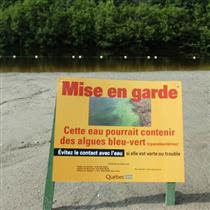Outbreaks of E. coli, typhoid and other water-borne pathogens are expected as drinking and recreational water is contaminated by run-off from heavy rainfall - sounds eerily similar; Here are some recent Lac Simon examples:
Baie L'ours blue green algae outbreak in 2005,
12 outbreaks of E-coli on Lac-Simon in July 2007;
Le Petite Nation riviere flooding April 2008;
heavy rainfalls these past 2 weeks in July 2008;
Baie Groulx blue green algae outbreak on July 28...
- Paul
Baie L'ours blue green algae outbreak in 2005,
12 outbreaks of E-coli on Lac-Simon in July 2007;
Le Petite Nation riviere flooding April 2008;
heavy rainfalls these past 2 weeks in July 2008;
Baie Groulx blue green algae outbreak on July 28...
- Paul
*****
Thursday, July 31, 2008
CBC
A new Health Canada report warns Canadians of the potential health risks of climate change, including spikes in heat-related deaths, an increase in respiratory and cardiovascular problems, and the spread and emergence of diseases.
"The findings of this assessment suggest the need for immediate action to buttress efforts to protect health from current climate hazards," says the 500-page report, entitled Human Health in a Changing Climate: A Canadian Assessment of Vulnerabilities and Adaptive Capacity.
It examines the effects under three categories: extreme weather events and natural hazards, air quality and heat, and diseases transmitted by water, food, insects, ticks and rodents.
The projected increase of floods in some areas and drought and forest fires in others are some of the natural disasters caused by climate change that will cause health-related problems, the report says.
As well, a rise in heat waves will be accompanied by an increase in heat-related deaths, the report says, with the greatest risk to cities because of higher population densities and the urban heat island affect.
Those at greater risk are people aged 65 and older, with summer mortality rates projected to be two to three times greater than for those aged 15 to 64, the report says.
Quebecers are singled out in the report, as they are noted for historically being able to adapt well to very cold temperatures "but have not been as successful adapting to extreme heat."
The report also focuses on how the increase in global temperature will affect the air Canadians breathe by increasing smog, wildfires and pollen production.
For example, an increase in the formation of ground-level ozone could lead to more respiratory and cardiovascular problems.
Based on a four degree increase in average temperatures, the report projects 312 more premature deaths each summer because of increase in ozone and a 4.6 per cent or $1.366 billion increase each summer in the health burden to Canadian society related to air pollution.
Climate change may also increase the spread of some infectious diseases, with the increase in temperatures allowing them to survive longer. More rain in some areas and more frequent droughts could increase risks of water contamination and water-bone disease outbreaks, the report warns. MORE >>>






Aucun commentaire:
Publier un commentaire